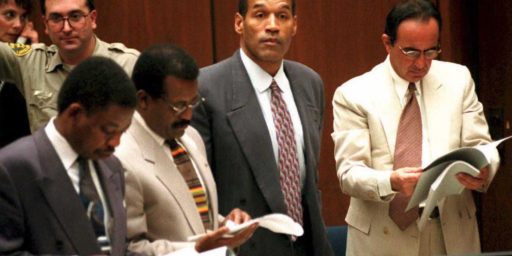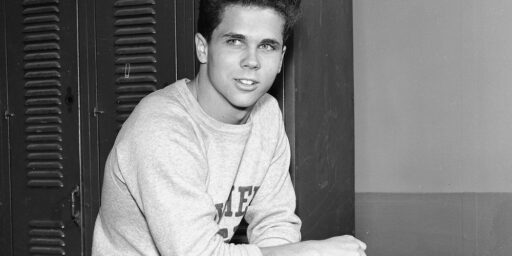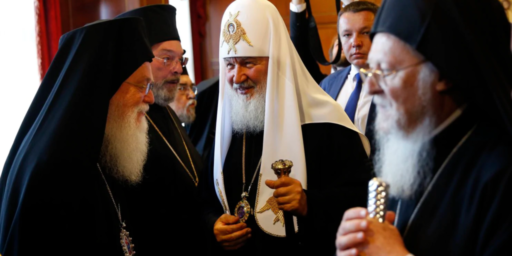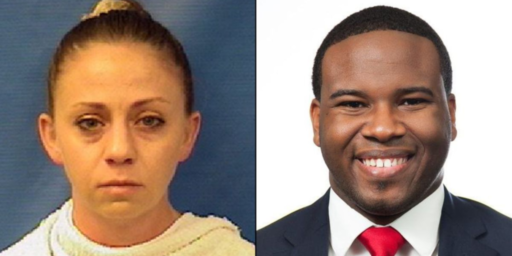The Doofus Dad – Why Are Sitcom Dads so Lame?
John Tierney wonders why Homer Simpson has managed to replace Ward Cleaver as the archetype of fatherhood in American situation comedies.
The Doofus Dad (NYT RSS)
One evening, after watching Homer Simpson wreck the family car at a monster-truck rally and plunge on a skateboard into Springfield Gorge, my 6-year-old son asked me, “Why are dads on TV so dumb?”
Having grown up with the omniscient fathers on “Leave It to Beaver” and “My Three Sons,” I wanted to give a bemused yet authoritative answer, chuckling wisely as I explained the ways of the world. But this question left me feeling more like Homer Simpson.
[…]
Ward Cleaver has been replaced by a stock character known in the trade as Doofus Dad. Explaining this change isn’t easy, but if Ward were still around, he could puff his pipe and offer several theories.
The most obvious is that the television audience has splintered along gender lines, and sitcoms are now a female domain. Four out of five viewers of network sitcoms are women, and they apparently like to see Mom smarter than Dad. Another explanation is the rising number of mothers with paying jobs. Now that they have their own paychecks, the old bread-earning patriarch is less essential and therefore more mockable. And TV writers no longer have an easy stereotype of Mom to work with. Jokes about daffy middle-class housewives like Lucy Ricardo and Edith Bunker seem dated now that so many women work outside the home.
[…]
Homer has become the longest-running doofus on television by appealing to guys, who have made “The Simpsons” one of the few sitcoms with a predominantly male audience. I asked Al Jean, the show’s head writer, why they keep watching. “Homer is the father that no one will admit to being that many fathers are,” Mr. Jean said. “He loves his kids, but there are a lot of times when he’d rather just go out for a beer.”
Homer embodies a famous distinction made by Margaret Mead: motherhood comes naturally, but fatherhood must be learned. It’s an awkward process. Before I became one, dads my own age often did look like doofuses as they struggled with drooling babies and their new domesticity – no more free time or disposable income, lots of chores to do and orders to take from wives ruling the home.
The last point, especially, is almost certainly true at the aggregate level. Being a good father has always been hard and it’s getting harder. A generation ago, fathers were expected to be good providers and provide a decent example for their kids. Now, they’re expected to do that plus actually help raise the kids. And, of course, the expectations of what it means to be “a man” were essentially static for generations but are now a moving target.
Ed Cone thinks Tierney is being too sensitive and points out that the doofus dad has been around for a long time in arts and literature.
Ah, for the days of the benign white patriarch. Not the freshest topic, you might think. But my research shows that the cardigan-clad stalwarts of television history actually get too little credit. It turns out that way before the 1950s — and right up to the very dawn of the TV era — fathers were frequently depicted as even worse than Homer Simpson at Moe’s.
It’s almost as if the old black-and-white laugh-tracked crapfests were the aberration, huh?
Ezra Klein offers that perhaps it’s just that middle class white dads are secure enough not to be offended, observing that,
If the majority of shows presented other demographics the way they present fathers, they wouldn’t survive a day. Ignorant blacks? Bitchy, materialistic moms? Moronic, accident-prone dads? The whole set fits, but only the last is widely allowable.
Quite true. Of course, the propenderence of Homer Simpsons and Ray Romanos on the sitcoms is something of a relief. The likes of Ward Cleaver, Andy Taylor, and Jim Anderson are incredibly difficult models to live up to.






The likes of Ward Cleaver, Andy Taylor, and Jim Anderson are incredibly difficult models to live up to.
“A man’s reach should exceed his grasp,
Or what’s a remote for?”
There’s also something to the idea that television portrays children as wisecracking coolios (remember that the Simpsons is definitely not aimed at the female demographic), which means they have to have a foil. Moms are more often shown as slightly lame but lovable. Fathers are perfect foils. (marge vs. homer, the 70s show mom vs. the 70s show dad, etc.)
The “number one dad” – according to TV Guide or some such outfit – was the Cosby Show’s Cliff Huxtable. Now, it has been a while since I watched the show, but from what I remember he was in no way portrayed as a doofus.
Those confident in their power allow themselves to be the butt of the joke.
The employees are allowed to laugh at the expense of the boss. It’s an old tradition. But it doesn’t change who’s boss.
Anyone else old enough to remember Ozzie and Harriet aka The Nelson Family? I seem to recall Ozzie portrayed as bumbling, of average intelligence and effectiveness, but always available for wife and kids. In short, rather true to life.
The other trend is the homely schlubb married to the hottie woman. Think King of Queens, Everybody Loves Raymond, Yes Dear, and the Belushhi show (cannot remember the title.)